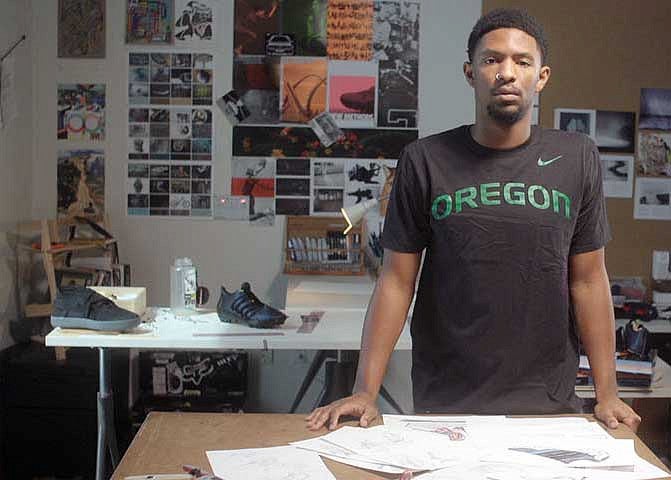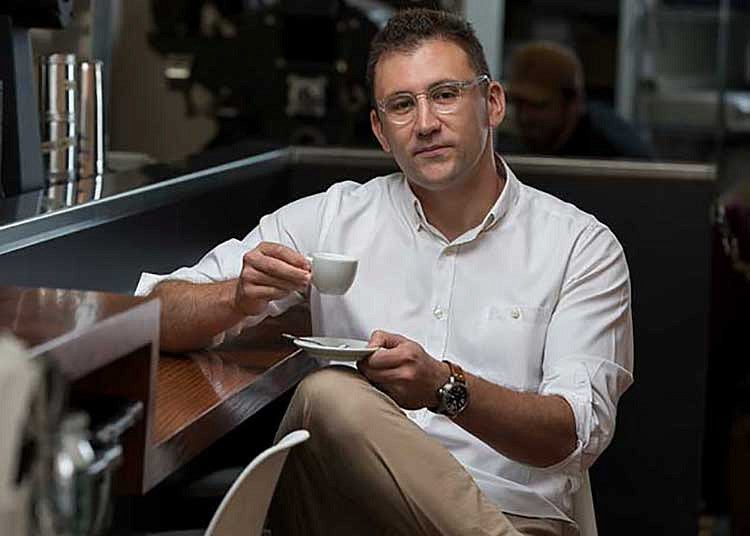It's history.’
The UO’s Black history reveals stories of strength, courage, and hope
Reverend Martin Luther King Jr. Rosa Parks. Jessie Owens. Fannie Lou Hamer. Frederick Douglass. Angela Davis. Reverend Richard Allen. Harriet Tubman. W. E. B. Du Bois. Maya Angelou. James Baldwin. Toni Morrison. Malcolm X. So many more.
Black History Month.
A time to celebrate, affirm, remember, recognize, dream. To look at the past and present, the challenges and opportunities. All the successes. All the work that still needs to be done. All that we strive to imagine for the future.
Here at the UO, Black History Month is an opportunity to celebrate and recognize the lives, work, and activism of our Black students, past and present. To celebrate what they have done to help us create the community we would like to become. To honor their struggles and their courage. To recognize how they have and continue to help us better address the needs of Black students and the UO, Eugene-Springfield, and Oregon African American communities. To see how their experiences and their commitment help all students gain equitable opportunities and access and pursue academic excellence. And also to celebrate how these students inspire us to continue to work toward creating a more inclusive space for students of the future through the recognition that we are not there yet, but acknowledging and celebrating how we have moved forward.
Black History Month at the UO. Exploring our past. Listening to our present.
Working toward an inclusive future.
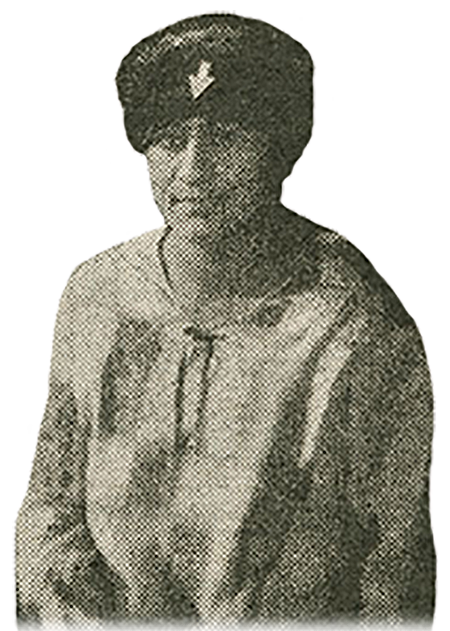

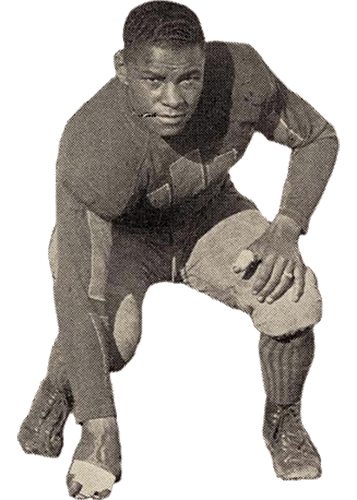
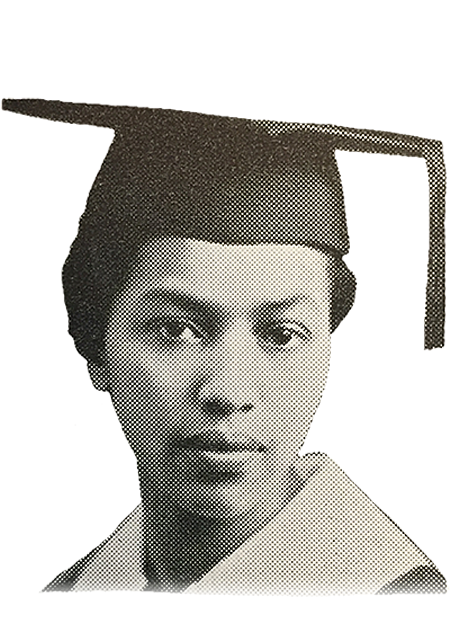
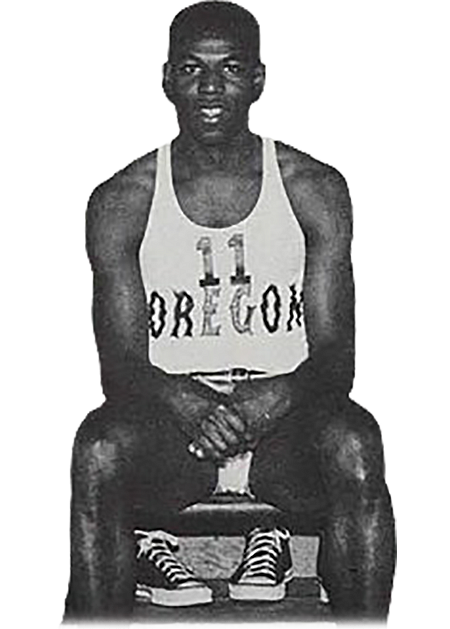
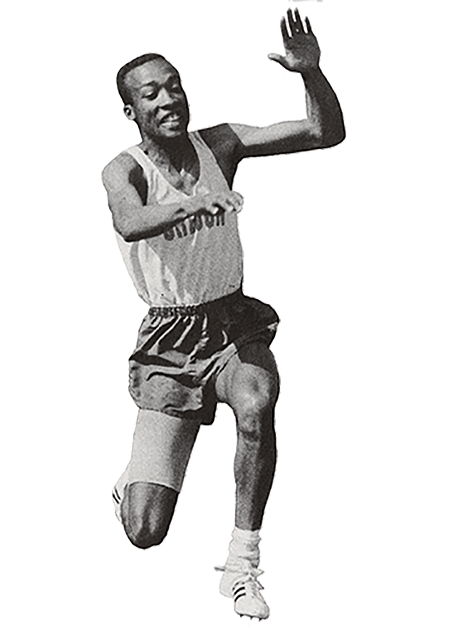
Builder of Community
Racism Denamed—How the UO Got Unthank Hall
It began as one demand on a list of 13 demands by the Black Student Task Force. It resulted in a victory on a brilliant summer day when a residence hall was renamed in honor of a community leader and the first African American to graduate from the UO’s architecture program.
On July 12, 2017, a small group gathered to honor a notable dedication on campus. In attendance were Libby Unthank Tower (DeNorval Unthank Jr.’s daughter), UO president Michael Schill, UO vice president for equity and inclusion Yvette Alex-Assensoh, Eugene city councilor Greg Evans, and many other community and student leaders. They all celebrated as a sign bearing the new name of the UO residence hall was unveiled, reading “UNTHANK.”

The building’s new name honors UO alumnus DeNorval Unthank Jr., BArch '52. But that is the third act of the story. The rest of the narrative only becomes clear when you learn about the former name that was stripped from the building—a name from the past that was associated with avowed, ideological white supremacy and the Ku Klux Klan.
It was the initiative and activism of Black UO students that brought the issue to light. In the fall of 2015, the Black Student Task Force presented UO leadership with a set of demands; one insisted (in part) that the university change the names of “all of the KKK-related buildings on campus.”
“It is our responsibility to bring the University of Oregon Mens agitat molem mission to life,” the task force wrote. “Utilizing our minds and capacity to move mountains of barriers, we will ensure that current and future Black students have a culturally appropriate and welcoming campus climate.”
A panel of three historians appointed by Schill documented the historical evidence of some of the Black Student Task Forces’ concerns. The historians exhaustively documented in their August 2016 report that the name “Dunn Hall”—then affixed to a wing of the Hamilton Complex dormitories—indeed commemorated Frederic Stanley Dunn, a former UO professor who was also the “Grand Cyclops” of the Lane County KKK in the early decades of the 20th century.
On September 1, 2016, Schill recommended to the UO Board of Trustees that Dunn Hall required a name change. The board unanimously adopted this recommendation on September 9, and the former Dunn Hall was temporarily renamed Cedar Hall. Following an in-depth task force review of historically distinguished, deceased, African American alumni of the UO, the president recommended and the board confirmed with a vote to honor DeNorval Unthank Jr.
The son of a prominent Portland physician and state civil rights leader, Unthank (1929–2000) was the first African American graduate of UO’s architecture program. He earned his degree in spring 1952, having overcome significant obstacles of both institutional racism and personal prejudice.
As a Black student, Unthank was not allowed to live in the dorms on campus, and was threatened with violence for dating a fellow student who was white. Late one night in May 1951, a cross was burned on the lawn of Gamma Phi Beta sorority, where Unthank’s girlfriend lived. (Read an eyewitness account by Deb Mohr in Oregon Quarterly.) This event was reported nationally and set off an intense debate around campus—“The Code of Prejudice at Oregon” declared one Daily Emerald editorial—but the perpetrators were never identified.
Two months later, when the couple decided to wed, they had to go to Vancouver, Washington, to hold the ceremony because mixed-race marriages still were outlawed in Oregon at the time (this ban finally would be repealed later in 1951).
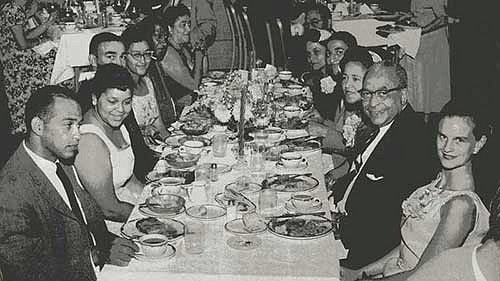
Despite the racism that he experienced, Unthank was determined to persevere in the community after earning his degree. He quickly established professional and family roots in Lane County. First collaborating with the local construction magnate Richard Chambers to build houses in south Eugene, he later cofounded the firm Unthank Seder Poticha Architects in 1968. He would marry twice and raise five children in Eugene.
During his career, Unthank designed numerous buildings in Lane County, among them McKenzie Hall on the UO campus, the Lane County Courthouse and its annex, John F. Kennedy Junior High School in Eugene, and Thurston High School in Springfield. He was celebrated for his work on banks, schools, and office buildings throughout Oregon and for his design of the US Consulate quarters in Fukuoka, Japan. Unthank also served as an associate professor with the UO School of Architecture and Allied Arts, now the College of Design, from 1965 to 1982.
In his long and accomplished career, DeNorval Unthank Jr. would receive more than 30 professional awards, including several for his efforts at energy-conscious design. In 1980, he was named a Fellow of the American Institute of Architects.
At the unveiling of the new sign, Schill reflected on the propriety of honoring a man who persevered in such a way.
“I think ahead to the future students who will eagerly unpack belongings into Unthank Hall,” said Schill. “They will be inspired by this tremendous man to make their own lasting impact at our university, state, and nation.”
“For our family, the naming of Unthank Hall helped clarify a belief we all had that the color of your skin does not define your capacity or ability to pursue your dreams.”
—Libby Unthank Tower
For Tower, the naming of the hall in honor of her father solidified the commitment her father had made to stay and establish himself in the community, which was not always easy for a Black man in a predominately white town.
“I think he would have been surprised and honored to know that the hall was renamed for him,” Tower said. “He was a humble man in regards to things like that. For our family, the naming of Unthank Hall helped clarify a belief we all had that the color of your skin does not define your capacity or ability to pursue your dreams. Dad was a person who felt it was important to live beyond judgment and race.”
While it took an official act of the Board of Trustees to remove the commemoration of Frederic Stanley Dunn from our campus, it had taken the actions of Black student leaders to help bring the man’s KKK history to light—and to demand full awareness and action from the UO community.
Alex-Assensoh praised the students’ achievement. “As a result of the initiative, creativity, persistence, and leadership of students who make up the Black Student Task Force, the University of Oregon has taken the important step of renaming a building after DeNorval Unthank Jr.,” she said. “His story of resilience and achievement inspires pride in all of our students. Each time a student now and in the future walks by or enters Unthank Hall, they will be benefitting from the work and legacy of the Black Student Task Force.”
Reflecting in the aftermath of the long and at-times-fraught renaming process, Schill observed the university’s work at fostering inclusion was far from over. “Bigotry and racism have no place in our society or in our university. It is vital that all students at the University of Oregon feel valued and included as part of this institution. While the process of naming or denaming a building has symbolic value, symbols are less important than actions that affect the material circumstances of members of our community. It is these actions that we now must focus on.”
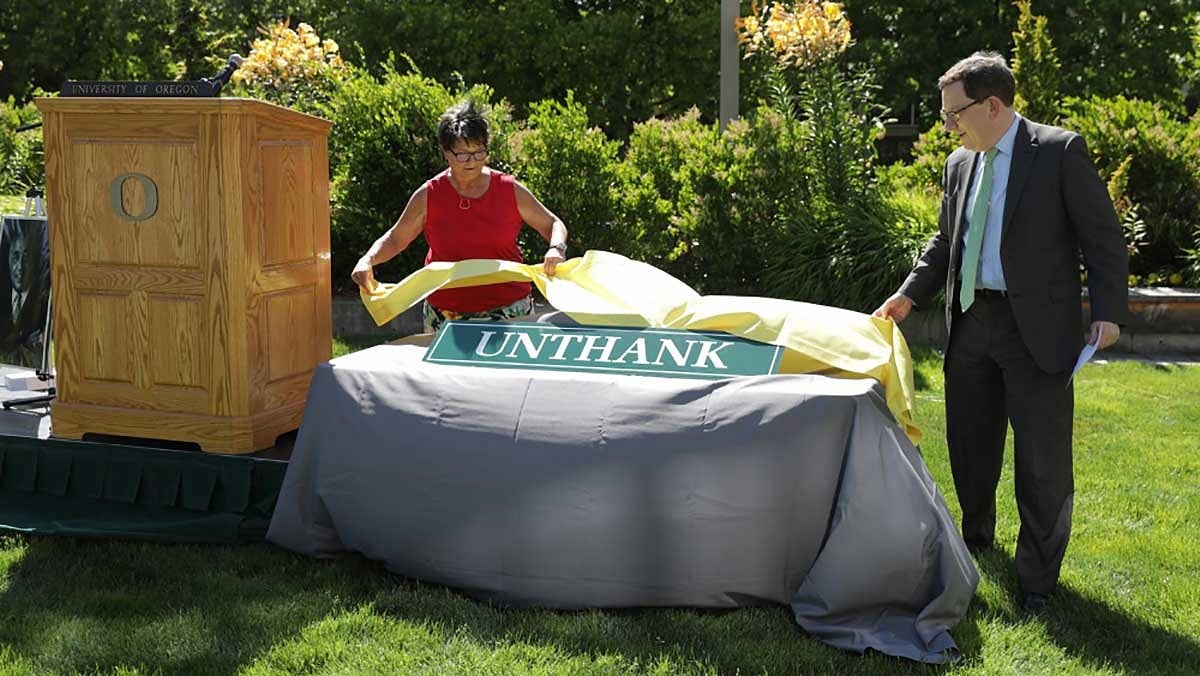
Part two of our Black History Month feature focuses on current Black UO student activists speaking on their experience, the past, and their hopes for the future in a roundtable discussion facilitated by alumna Anetra Brown, and will run next week.
Make Your Own History



